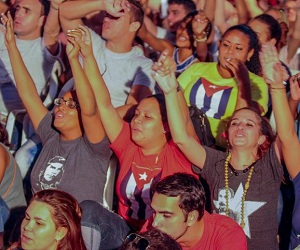 From “La Bayamesa,” by Céspedes, Castillo and Fornaris, written in 1851, to “Me dicen Cuba,” in which Alexander Abreu inserts the notes of the Bayamo anthem in his boisterous son, the homeland has been sung one, ten, a thousand times, in its purest, deepest essences. Because a people with music in its soul expresses its sense of belonging in the art form that best represents it.
From “La Bayamesa,” by Céspedes, Castillo and Fornaris, written in 1851, to “Me dicen Cuba,” in which Alexander Abreu inserts the notes of the Bayamo anthem in his boisterous son, the homeland has been sung one, ten, a thousand times, in its purest, deepest essences. Because a people with music in its soul expresses its sense of belonging in the art form that best represents it.
In the face of this rich, permanently evolving tradition, any attempt to pervert feelings and erode convictions by means of operations such as the one circulated recently from Miami – where else – will fail miserably.
There are no hidden agendas. The lyrics openly call for the restoration of capitalism and the overthrow of revolutionary power in Cuba. In reviewing the launch, provided by communication channels at the service of subversion, the EFE news agency highlighted these objectives: “The song is openly opposes the government of Cuba and its policies.”
There are no arguments, but a string of assertions, commonplace in the anti-Cuban discourse: a dictatorial Cuba where lies, repression, and torture predominate; a dictatorship without popular support , (“you are already outnumbered, you have nothing left, you are going down, the people are tired of putting up with you”)
There is not even the slightest hint of wit, not a shred of intelligence in the crude conversion of the slogan Patria o Muerte (Homeland or Death) into Patria y Vida (Homeland and Life), the title of the diatribe. As if the defense of life, freedom and resistance were not embodied in the slogan that has accompanied Cubans since Fidel spoke during the farewell tribute for victims of the La Coubre sabotage.
Nor is the alliance of the protagonists surprising. Celebrities, a couple with talent developed in our educational system had commercial successes in Cuba and were promoted by fashionable currents within the trend that has come to be called urban music – although it is well known that fame and talent are not synonymous .
Until, dazzled by their eagerness to gain greater revenues, seduced by Floridian show business linked to the anti-Cuban industry, and seriously miscalculating the Cuban people’s capacity of resistance to the brutal onslaught of Trump, they tore open their shirts to reveal the precariousness of their ethical principles, if they ever had any at all.
Thus, once they were comfortably installed in Miami, they began to bawl, malign, rant and rewrite their personal stories. One erased from his memory the verses he sang in 2016: (“I return to the cradle that saw me born / I return to that neighborhood that saw me run / what I was, what I am and will be for my beautiful island”); another, as if to leave no doubt of his moral standing, disavowed having greeted the President of the Republic of Cuba during a concert (“It was a mistake… I was afraid”), and a third, encouraged no doubt by a hallucinogenic high, threatened to come “give” the island’s leadership a bit of his “machete.”
This last performer reveals his likeness to another guest invited to participate in the show: the delinquent who in Havana called on Trump for “fire, fire and fire, to put an end to this,” meaning more blockade and an invasion of Cuba. The fire that in the video burns a Cuban flag. The vile fire with which they attempt to trash the memory of Martí and Che in their lyrics. Fire against the homeland, against life.
It would be good to keep in our hearts the words written by Martí to a compatriot in 1886: “The homeland needs sacrifices. It is an altar, not a pedestal. It is served, but it is not taken to be of service.” And to accompany these words with a soundtrack that includes, among others, Silvio Rodríguez’s Pequeña serenata diurna.
(Taken from Granma)